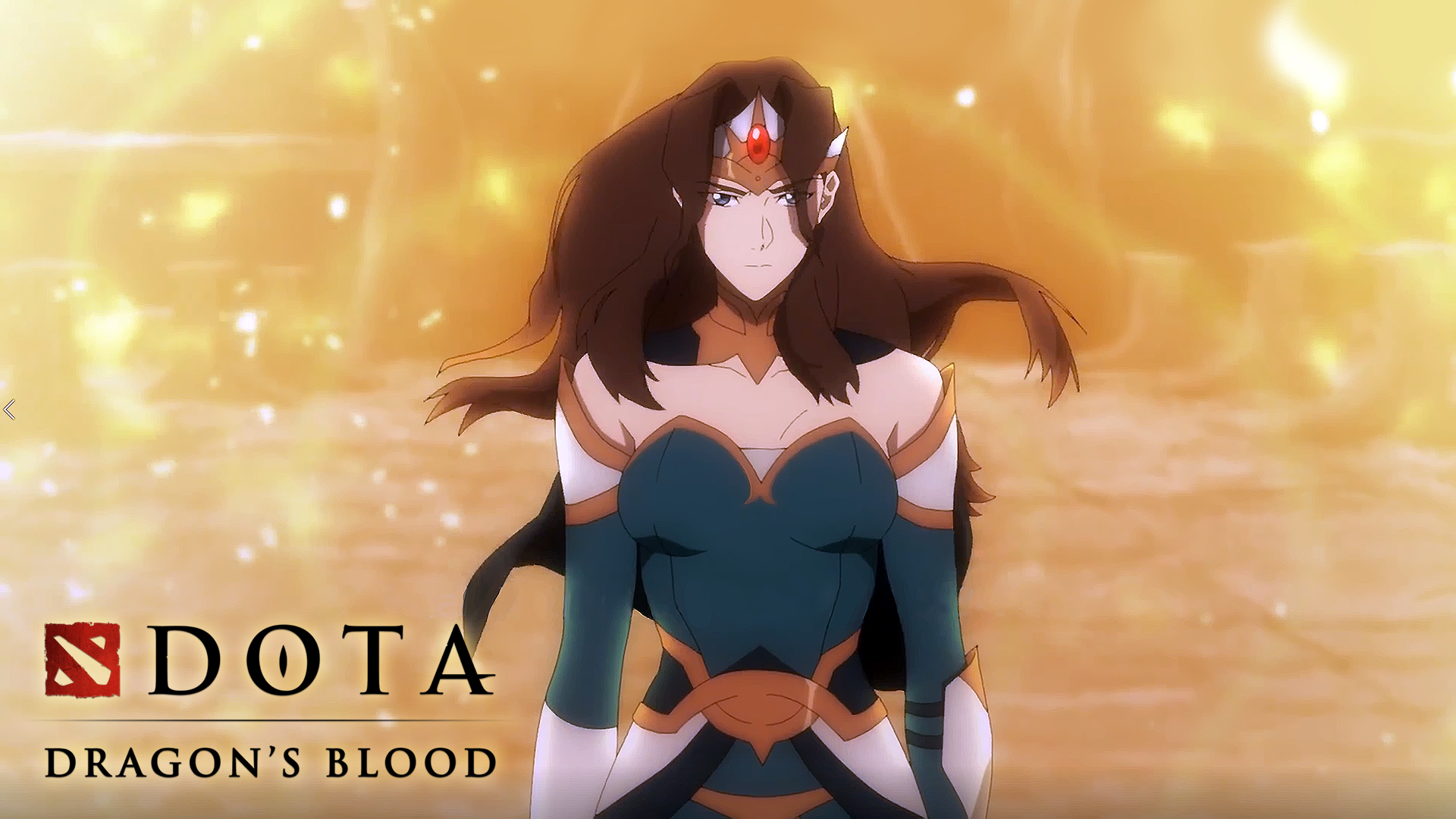DOTA: Dragon’s Blood
Book/Season 3
Air Date: 8/11/2022
The multiverse is featured everywhere this year. Whether it’s Marvel’s Multiverse of Madness or A24’s Everything Everywhere All at Once, it’s been a surprisingly popular time for the use of multiple universes and timelines in stories. Which is why it was so surprising to see DOTA: Dragon’s Blood Book 3 do such a great job in adapting one.
Season 3 features some of the best-animated action sequences seen in the series. The flexibility of redoing the timeline provides an opportunity to explore routes that the previous two seasons hadn’t taken, using many of the same characters. It serves as a form of better character exploration, while also, providing everything you’d want from a DOTA epic. Including heroes marching against legionaries battling other heroes in what’s surprising, a well-thought-out backstory.
In many ways, the first few episodes make up for the breakneck pacing of book 2 by exploring a ‘What if?’ type of timeline examining who these folks would be had they taken a different, more character-centric, path. Watching these episodes with both the context of what happened and the histories of these characters, anchors their plight in regret of the choices not taken when they were alive.
Book 3 is the best of the series not because DOTA reinvents itself, but rather, because it connects everything we’ve seen. It weaves everything we know into a singular cohesive storyline that leaves us crying, laughing, and cheering these beloved heroes from the games that have grown so much since the series debuted.
When you take all 3 books of DOTA as one 24-episode anime: it’s a near perfect series, binge-worthy amongst the best anime out there.
Let’s dive into why. Spoilers warning for book/season 3 ahead.
A Tale Three Seasons In The Making
The story kicks off three months after the season 2 finale and things have permanently changed. Terrorblade has defeated Slyrack in the season opener, leading to the need for a call for a heroic team-up. A final assault against the demon once and for all.
In what could have been a series finale, the first two episodes of the season dedicate themselves to resolution. You see every hero face down the demons of their past in a final battle against Terrorblade in the voids of Foulfell. In doing so, it also allowed for the animation department to shine and showcase each and every hero entering their most powerful form, in a spectacle of combat that was explosive to witness.
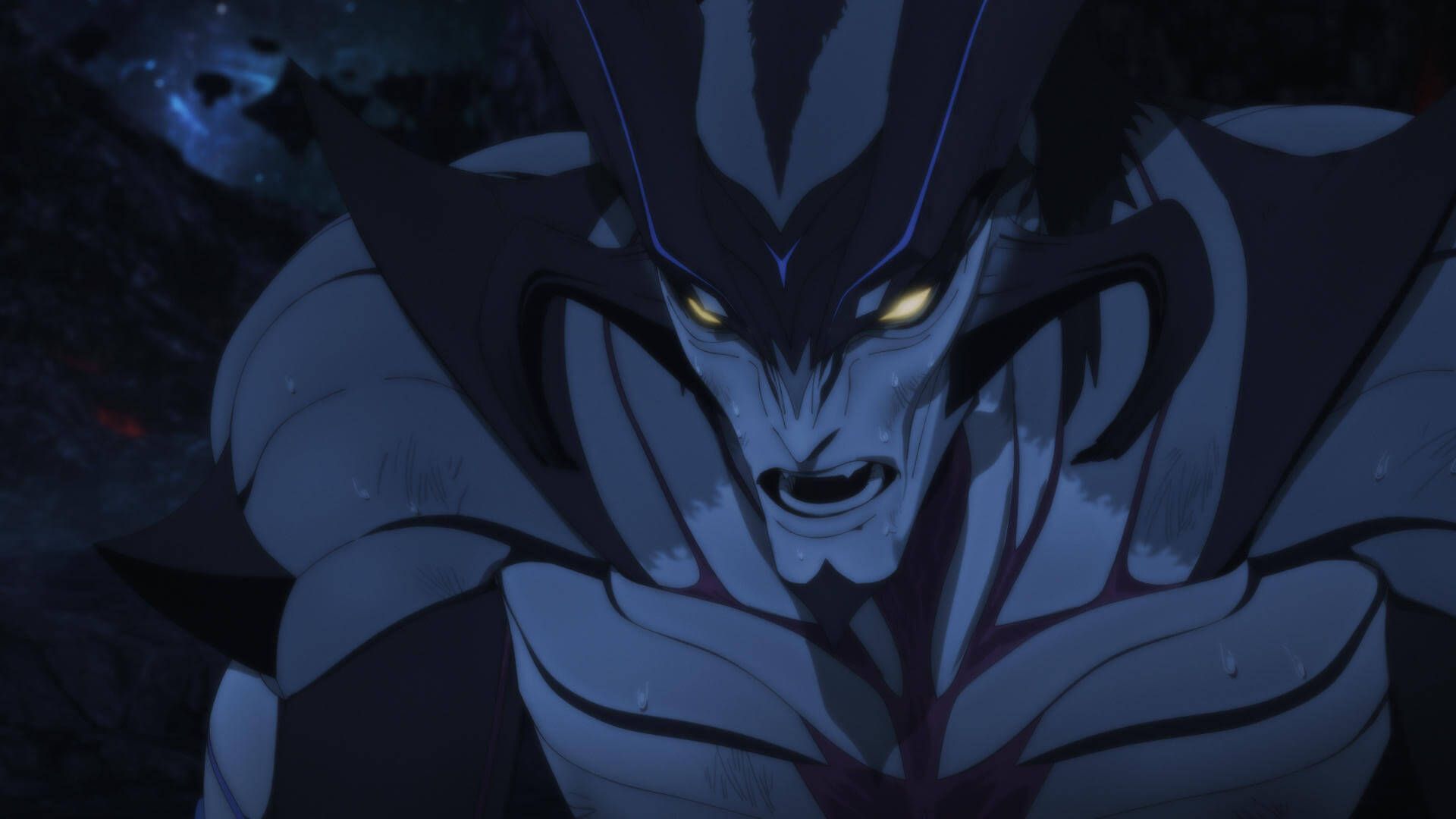
Davion became the full embodiment of the thunder. The moon god Fymryn embraced her inner Goddess as Mene. Sun God Mirana fired light into the darkness of the void. Luna and Kaden got to slay legions of mind-controlled dragons and warriors. Overall, the showdown against Terrorblade and his legion of manipulated followers made for an Endgame-level event.
What was brilliant then, was in getting to see how menacing of a villain Terrorblade is onscreen. How much of his pride comes out in characteristic fashion. Fans of Warcraft may remember that Terrorblade was inspirationally and skin designed, off the concept of Illidan Stormrage. You can absolutely see that pride and gravitas here as DOTA holds no restrictions in Terrorblades flaunts. Which Davion, capitalizes on in heroic fashion.
We’re meant to cry seeing Davion do what he does best in acting stupid, forward, and courageous, in a valiantly dumbfounding play at hero one last time. Even though, in this case, it doesn’t happen. The inevitable betrayal in seeing Invoker finally make his move is what fans had long waited for and was finally delivered. What’s better, is that this multiverse reset does amazing work in terms of fixing issues we had from Book 2, particularly, regarding extra screen time needed to develop character. More importantly, going back fills so many gaps of essential backstory as to why we should care.
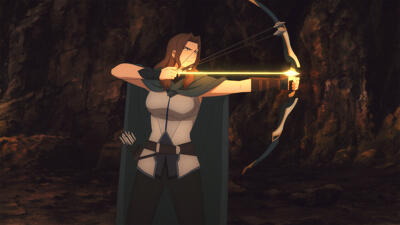
We see Marci return to play the supportive best friend and emotional rock to Mirana’s entire universe. We get to find Lina embracing her role as champion and slayer of legions, hero to the Sun Kingdom, but most importantly, a loyalist to Mirana and the people. Davion gets to be the heroic Dragon Knight along with Bram for a time, and Mirana, we finally see act out as The Sun Kingdom’s ruler, how she is with her father, and most importantly: abruptly handles all of the kingdom’s feuding geopolitics in ways that would make Daenerys Targaryen from Game of Thrones proud.
All of these storylines feel like they needed to be explored and finally get to be and it’s a brilliant showcase of writing. Given the runtime, we’re catching the moments at the end of their respective duties so it never feels too bogged down, yet at the same time, present the conflict of the world that was lost, is going to become lost, and yet similarly, needs to be. It’s the best thing about this season: how it’s a journey not about fixing the broken things of the past but rather, accepting what is, and learning to live with it.
Tying the story together, Mirana tries to bring the group back into the fold of the original timeline to fix everything that was lost. The consequence of disrupting the status quo of the new multiverse world showcases some serious development of character, as not only does everyone reflect on who they were and what they became, but also, had to actively choose what to do about it. The use of multiverse thus feels genuine in terms of accentuating the story rather than exploiting it, say, like a bunch of other franchises of late.
Strangely, DOTA Book 3 feels like a JRPG in that the season does a good job going over each faction. There’s a balance of soldiers, fantasy fiction, and action that move together with the rush of an end-of-universe implication. Most importantly, ties with the dire feelings Mirana is exposed to, as she does an awesome job bringing everything together. Her desire to go back before the end of Book 2 mirrors sentiments the audience is feeling. Because we don’t want to reach the end. We don’t want to have lost all these characters. We don’t want death to affect us the way it has Mirana and company.
One of the best things about the writing is how much we’d want to see this reality of the heroes, back to normal. What’s tragic about the new multiverse timeline then, is that despite the happy ending, it never lasts. Fate can’t be changed, no matter how much altering of creation someone like Invoker tries to do. All in the name of Filomena.
I can’t stress enough—so much of the series is about embracing loss. I think it pulls it off in a form that most series are too uncomfortable to capture. How we should treasure the things, and the people, we have right now, and how you can’t fix the broken past. You can only embrace the present.
The Pacing Still Feels The Same But Works When Recontextualized
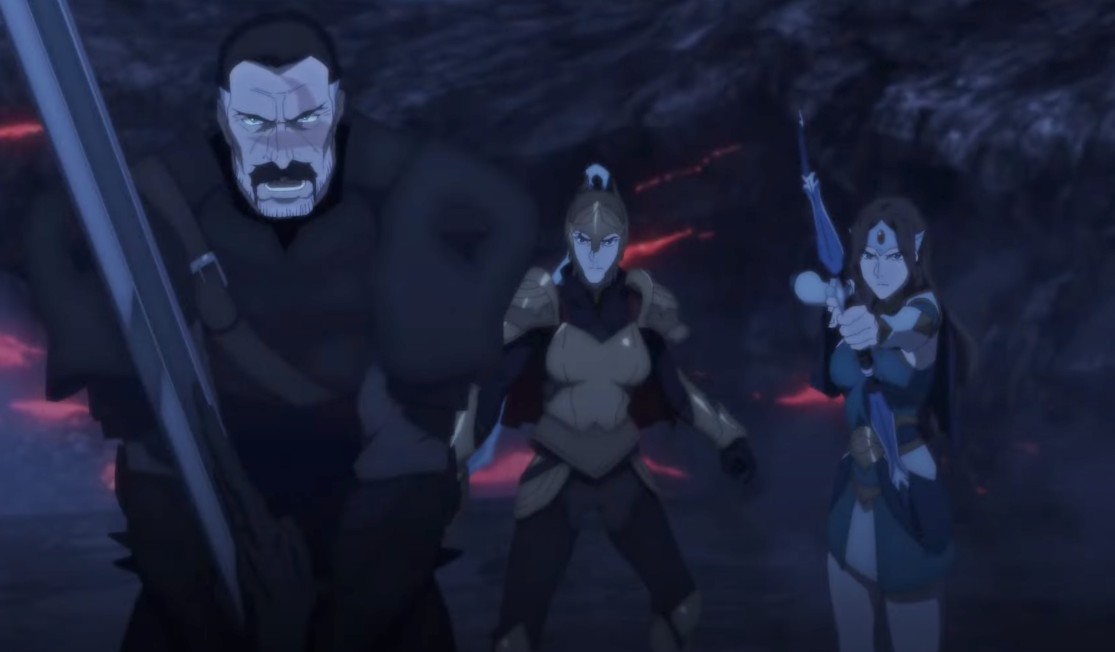
For those who were not fans of the breakneck pacing last year, unfortunately, that style hasn’t changed. A lot happens in minutes regarding exposition, though when looked at individually in comparison to the whole of the series, it does feel better spaced out. The benefit of Book 3 is that since we’re at 24 episodes, you can rewatch from the beginning and see how small, boring, meandering scenes actually are significant. Especially, if you analyze it as a single-season 24-episode anime.
As for the rest, the artwork is still gorgeous and features some of the best backgrounds in anime. I also praise the design of the world, as this season goes all out with trees with hearts, dual moons crumbling, stark scenes of dark and pink worship me moments, and of course, Goddesses. As DOTA continues to be one of the strongest female-led series that the show never gets enough credit for.
Combat is even better than before. The battles are epic and shot like this is the end of all things, and so in many moments, it feels like an actual DOTA match. As you see heroes face off and battle legions of armies.
Atop of all this, there’s a good sense of the lore now established this season with how it all wraps together between the Dragons, Goddesses, and the Invoker/TerrorBlade and Filomena multiverse storylines. You even get some really nifty DOTA hero cameos such as Tiny and Zet, whose appearances, are sort of described in the crystalic nature of the lore. With art that’s a love letter to the game and fans who’ve been playing for over a decade.
Heroes At Their Best
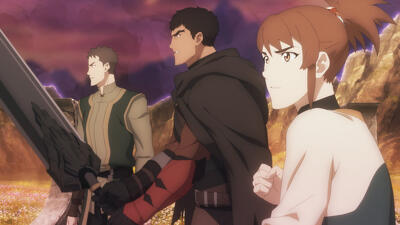
I think I speak for everyone in that I’m super happy seeing Davion and Mirana as sort of an established behind-the-scenes couple early in the season. He goes on adventuring. She goes off Queening. They sort of meet when he visits and embraces like an unspoken couple. That Davion puts unrelenting trust in Mirana is heartwarming. That she confides in him over everyone else, is strangely comforting.
It’s weird how healthy of a power couple we see them early on, yet also, doesn’t need to be publicly displayed. It’s also adorable to see the pair meet cute again for the second time in the series and I think overall, Mirana and Davion really make the adventure the best it can be, given how much it’s all experienced from their points of view.
Davion plays a central role this season in how he becomes the vessel for all the dragon souls. It also makes him go extremely Dragon-God-like so his fight sequences feel like something straight out of Dragon Ball Z levels of epic.
Mirana meanwhile, is the focal point of the tale, allowing us to also see Marci, Luna, and all of the drama from the Sun Kingdom in an entirely new light. Again, the multiverse’s second take allows for some seriously needed context as to why, despite the reset, all these turmoils play out the same way. It also tells us a lot about the characters and makes us have a better understanding that some people, such as Mirana’s uncle, Shabarra, are terrible people.
The second take also forces Mirana to acknowledge her flaws as a person. Seeing Lara Pulver present such range is a delight, as Mirana’s struggle is really showcased by Pulver’s ability to annunciate as someone with such regale undertone, yet also, sound flawed. Seeing her freeze over seeing Marci and Davion again, her love and best friend, and how much she wants to stop both from dying is such a great character moment. It’s a testament to her voice acting strength, but also, just her character work in both the plotting and character arc the series has done wonders with her.
How Mirana, despite having these amazing gifts, is still flawed and human, presents a groundedness to the story. How despite our favorites hitting God-levels in power, it never feels one-sided. Because all the power in the universe just can’t undo certain scars.
The only problem I had character development-wise was Fymryn and Selemene’s storyline. Mostly, because it resolves straightforwardly converting Fymryn/Mene to become the series’ strongest supporting character. In doing so, it provides her with many great moments of Wisdom, but also, sort of completely says goodbye to the Fym we remembered and embraces more of the Goddess Mene and her role.
Speaking of which, the series’ newest addition, Filomena, is amazing. Genevieve Beardslee (young Filomena) and Alix Wilton Regan (adult Filomena) together do such a wonderful job in the character portrayal that I hadn’t even realized it was two separate actors.
Filomena feels like a genuinely curious yet brilliant young woman. One whose cadence somehow bounces off Troy Baker’s Invoker with ease. The conflict between her and Invoker makes for the series’ best storylines as it’s not just the best in magic, but also, cunning. She’s got the mind of Invoker but the heart of someone… who genuinely cares about the value of life.
Now, if you’ve ever played DOTA, Invoker has since the very beginning of the game, been one of the most complicated and annoying heroes of the franchise. Someone who when played right can absolutely cause havoc in any role and situation.
This is why having him serve as a true series antagonist/anti-hero has done the show wonders and really showcases this translation from game to story. Troy Baker does fantastic work in portraying that cold and calculating maniacism. That despite all evidence of madness, Invoker acts as if he’s the only one that’s… sane. Yet, The Invoker taking advantage of everyone, along with the horrifying revelation of all those timelines makes him in my opinion: the true villain of the series. He’s like the magical version of Rick Sanchez, yet somehow, worse. A dark example of a person who’ll destroy literally everything to get his way, even if it’s in the name of an act of love: like keeping your daughter alive.
The Ending
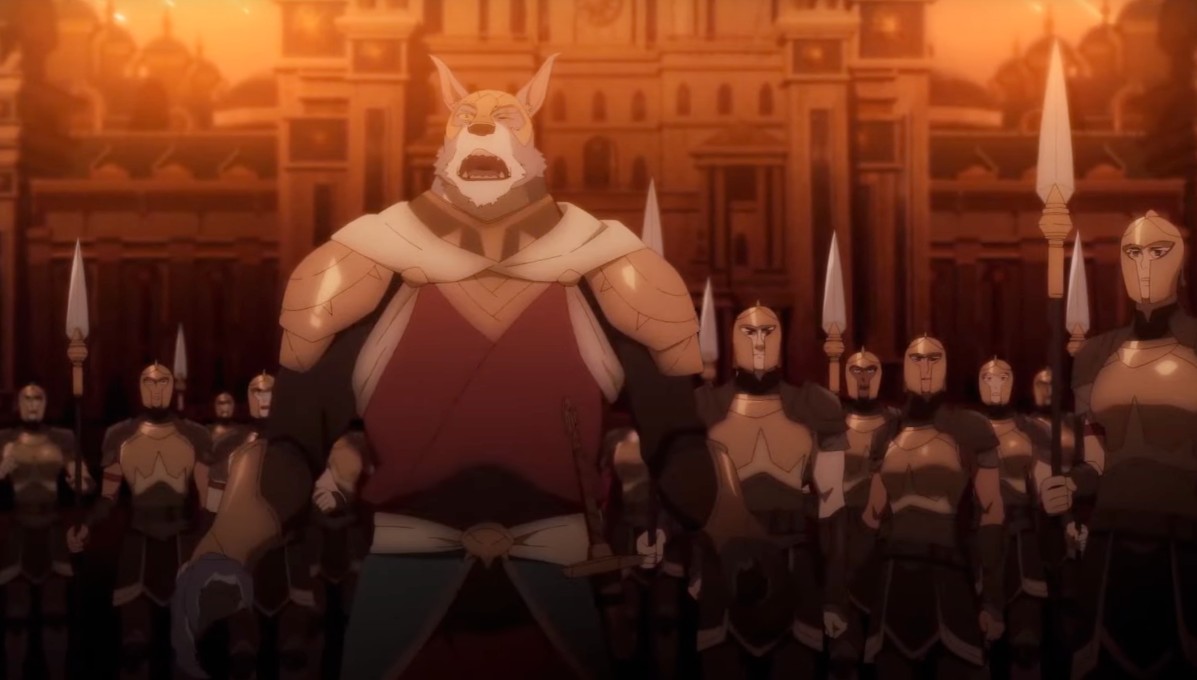
How DOTA begins versus how it ends comes full circle. And though the ending is ambiguous in some ways, and gives a sense of finality in others, it’s interesting to see how it all ended.
Looking at the series from this end and back to the beginning, so much of the series is about reshaping a better world, but in actualization, having to learn to accept the flaws of the current one. Invoker reshaped the universe in 12,403 attempts to make it perfect and in doing so, killed all of existence that many people, each time it failed. All just for a little bit more time with his lost daughter. It’s a dark testament to how much people are willing to risk to get things their way.
My thoughts on what happened regarding how Filomena survives is that in the beginning Terrorblade and Invoker spoke, where a bargain was rejected due to the stipulation that a world created by Terrorblade was unacceptable for Filomena to live in. Yet, we end the season with one created by Mirana. A loophole of the same conditions but with a different God in Mirana over Terrorblade. How this could play out will be fascinating if there is a Book/Season 4.
The Verdict
I think that there’s a really sweet quote from the series that summarizes my thoughts about it well:
“Love is not about making a perfect world. Free from harm and free from pain. Love is living together in the world as it is, come what may.”
Between this message and a fantastic job across the board regarding the acting, writing, and overall lore connection, I think DOTA makes for one of the most beautiful 24-episode animated series ever made. I really hope DOTA: Dragon’s Blood continues.
Regardless, thank you all around to the actors, animators, staff, and showrunner, for doing a series like this in a time like now.
Episode Rating: 4.75 stars out of 5

